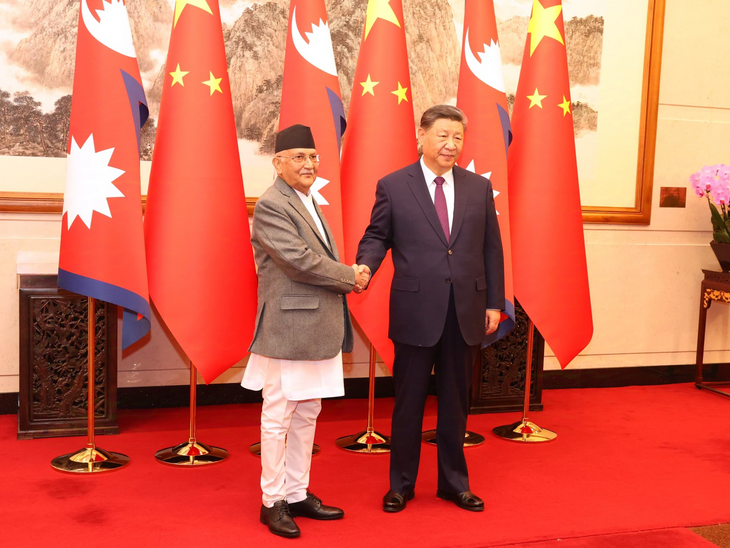Nepalese Prime Minister KP Sharma Oli with Chinese President Xi Jinping. Photos – Social Media
Nepali Prime Minister KP Sharma Oli recently paid a five-day visit to China. During this period, Nepal officially joined China’s Belt and Road Initiative (BRI) framework agreement. The objective of this agreement is to create a multi-dimensional trans-Himalayan connectivity network. Through which Nepal needs to be transformed into a regional business and connectivity hub.
According to India Today, this plan includes many important infrastructure projects like highways, railways and energy networks. It promises to boost economic growth by increasing Nepal’s connectivity with China and other Asian countries.
KP Oli, during his meeting with Chinese President Xi Jinping, described the BRI as a turning point for Nepal. He stressed that this would bring new development opportunities to Nepal. Better infrastructure will open up new opportunities for business, tourism, agriculture and hydropower.
Nepali diplomats sign BRI project with China.
Fear of China’s diplomatic trap in Nepal
Nepal’s formal participation in China’s BRI project indicates a major shift in its foreign policy. Historically, Nepal has enjoyed very friendly relations with India. However, Nepal has been seeking new economic opportunities with China for some time to reduce its dependence on India.
China has made many promises aimed at transforming Nepal’s infrastructure through the BRI project, but this is also seen as a Chinese diplomatic trap in the debt trap. Experts say that whichever country fails to repay the BRI loan, its strategic properties will be grabbed by China.
Similarly, China had leased the Hambantota port to Sri Lanka for 99 years after failing to repay the loan.
Nepal and China signed an agreement in 2017 regarding the BRI.
Initially, Nepal requested a grant (financial assistance) rather than a loan for the BRI project. However, during Prime Minister Oli’s visit, the words investment and assistance were used in the agreement instead of subsidies. This is why there has been more ambiguity on this subject.
An agreement on BRI project was signed between Nepal and China in 2017. According to this, nine projects were to be carried out in Nepal with Chinese money, but even after seven years, no project has yet been launched in Nepal. In fact, the previous government wanted China to give money to Nepal in the form of financial aid rather than a loan. But China denied it.
Plan to connect 70 countries via BRI
China’s Belt and Road Initiative, namely the BRI, is also known as the New Silk Road. This is a connectivity project of many countries. Under the BRI, it is planned to connect 70 countries in Asia, Europe and Africa by rail, road and sea. China wants to build ports, naval bases and observation posts in the Indian Ocean or in countries close to India.
Through the BRI, China provides huge loans to many countries. If he is unable to repay the loan, he seizes their ports. It is the largest project ever launched by a country.
——————————————
Corruption allegations against Chinese defense minister for third time in a row: Name raised in military’s anti-corruption campaign, many senior officers also under investigation
Chinese Defense Minister Dong Jun has been implicated in allegations of corruption within the Chinese military. After that, an investigation was opened against him. According to a November 27 Financial Times article, Chinese Defense Minister Dong Jun was implicated in the allegations as part of an anti-corruption campaign targeting senior officials of the People’s Liberation Army (PLA). . here…

